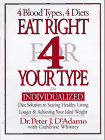Favorite Health Routine
An Effective Diet and
Exercise
Plan for Longevity and Fitness
Protein Power is a low-carbohydrate and high-protein diet much like the
Atkins diet below. However, Protein Power uses the latest metabolic
research (a subfield called bioenergetics) to make the diet the most effective
and efficient one available. One learns, for example, that a daily
minimum protein is required for your body mass, size, age and sex. (The
husband/wife physician team help you calculate this by making various measurements
of waist, hips and wrist, compare them to a table and go through several
calculations.) This book, in short, is more involved and probably
more useful, effective. The physician couple tell you that the protein
minimum is required to keep your muscle mass. The carbohydrate maximum
is to prevent fat gain and cause fat burning (lipolysis/ketosis).
Fiber, though carbohydrate, can be ignored because it is metabolically
inert. It will not trigger insulin and therefore can be subtracted
from your carbohydrate maximum. A protein equivalency chart to ensure
a daily minimum of protein in various combinations is provided on pages
154-157. Worksheets to plan your diet on these criteria are also
provided for you to copy and use conveniently. The book by Corrine
Netzer catalogs the carbohydrates and fiber (and calories, cholesterol,
fat and sodium) of many foods in a 770 page book. The couple
also recommends vitamin supplements to increase energy and metabolic efficiency
much like Dr. Atkins. However, unlike Atkins, he provides the names
of 4 suppliers that are easily available at retail health food stores on
page 186. The 2 physicians also recommend exercise to help release human
growth hormone (hGH) from the pituitary gland in greater amounts that will
help one's diet. They points out that weight training has the highest
output of hGH but aerobic exercise is also very useful. The training guidelines
are on pages 205-206.
Dr. Sear's book is highly recommended by Drs. Eades in Protein
Power: It has "great chapters on nutrition and chronic fatigue syndrome,
cander, heart disease and other chronic illnesses and sports performance".
Eat Right for Your Type according to the numerous reviews seems to
suggest that the 4 blood types have different immune system behaviors and
also react to various foods with differing sensitivities. Mild food
intolerance may lower energy, dry one's skin, etc. and these are really
"subclinical" allergic immune reactions to some foods. Such appears
to be the premise of the book and seems a reasonable hypothesis. I look
forward to reading this book in the near future.
This diet works extremely well for the vast majority
of those who try it. It is based on the metabolic principle that one's
metabolism will change dramatically if one deprives the body of significant
carbohydrates (less than 40 grams). Carbohydrates break down into
glucose which triggers the release of insulin. In so doing, the regulation
of metabolism switches from one with high glucose and therefore high insulin
to one in which insulin is not released into the blood. Insulin is
a powerful hormone that is associated with the well fed state. Insulin
instructs the body to store surplus glucose, lipids and protein as fat
in the body's tissues (especially adipose tissue). In biological evolution,
this insulin mechanism protected organisms from starvation during times
of drought or food shortage. When the dietary carbohydrate intake
was low very little glucose is produced so that insulin is not released.
In fact, if the blood-sugar level is low enough, the body will release
an alternate hormone called glucagon (as well as enzymatic proteins called
fat mobilizing substances or FMS). Glucagon and FMS break down stored
fat to convert the fat into ketone bodies. These ketone bodies are very
similar to the glucose that the body would have otherwise used for energy
in a high carbohydrate/sugar diet. By restricting one's carbohydrate
intake, the body cannot produce glucose and therefore has no alternative
but to use either fat or protein. Since fat is easier to break down
(into ketone bodies) than protein is, it is used first. The low carbohydrate
diet is intentionally high in protein (mostly meat, nuts, etc.) so as to
prevent the break down of muscle tissue. For those athletically
active, a high protein diet can also stimulate increased muscle mass with
the extra protein.
minor side effects of this diet and their explanation:
1. Protein is mostly nitrogen in the form of amino acids. Whatever amino
acids are not used for energy or for building muscle mass due to Tae Kwon
Do (or some other exercise) are likely to be disposed of by the body as
liquid urea (urine) thus requiring more trips to the bath room.
2. Carbohydrates - the biochemical word for sugar - are carbon
and water as the name implies, carbo + hydrate. Much of the water
a person on a regular (glucogenic) diet has comes from the metabolism of
these carbohydrates [aside: facilitated by oxidation from respiration].
Because carbohydrates are greatly restricted in this ketogenic diet, one
is likely to require more liquids and find on9e's self more thirsty.
3. The ketogenic diet appears to speed up the metabolism - the break
down and usage of food. This may be due to the action of glucagon
and/or other hormones/enzymes. Regardless, one is likely to find
himself more hungry and in need of increased snacking or food consumption
generally.
 |
 |
Tae Kwon Do is a superb form of exercise for many different reasons.
Browse my Academy's web site to
get a better idea of Tae Kwon Do in particular and martial arts in general.
Annotated links to Tae
Kwon Do web sites and martial
arts web sites can be found at my Academy's site. |
| The World Tae Kwon Do Federation (WTF) is the official global organization
that is recognized by the International
Olympic Committee (IOC) as the solely authorized body for Tae Kwon
Do. In the United States the United States Tae Kwon Do Union (USTU)
represents Olympic hopefuls from the USA and is the sole authorized body
for the United States Olympic Committee
(USOC). |
 |
 |
Return to table of contents.
E-mail me.










